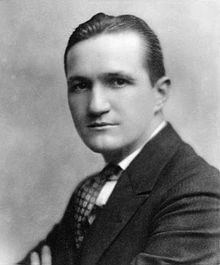Tom Powers
| Tom Powers | |
|---|---|

Tom Powers in 1922
|
|
| Born |
Thomas McCreery Powers July 7, 1890 Owensboro, Kentucky, U.S. |
| Died | November 9, 1955 (aged 65) Manhattan Beach, California, U.S. |
| Cause of death | Heart disease |
| Occupation | Actor |
| Years active | 1911–1955 |
| Spouse(s) | Meta Murray Janney (married 1929–1955) |
Tom Powers (July 7, 1890 – November 9, 1955) was an American actor in theatre, films, radio and television. A veteran of the Broadway stage, notably in plays by George Bernard Shaw, he created the role of Charles Marsden in Eugene O'Neill's Strange Interlude. He succeeded Orson Welles in the role of Brutus in the Mercury Theatre's debut production, Caesar. In films, he was a star of Vitagraph Pictures and later became best known for his role as the victim of scheming wife Barbara Stanwyck and crooked insurance salesman Fred MacMurray in the film noir classic, Double Indemnity (1944).
Thomas McCreery Powers was born in 1890 in Owensboro, Kentucky. His father, Colonel Joshua D. Powers, was a banker; his uncle was sculptor Hiram Powers. Tom Powers' mother loved the theatre and enrolled him at ballet school at age three. He entered the American Academy of Dramatic Arts at age 16, and he studied drama, wrote and produced plays, and practiced stage design in a small theatre in the attic of his home. Powers apprenticed to a pantomime troupe for ten years and became a star of Vitagraph Westerns. Powers appeared in over 70 silent films from 1911 to 1917 opposite such actors as Florence Turner, Harry T. Morey, Clara Kimball Young, Alma Taylor and John Bunny.
Powers had great success in his first Broadway appearance, as William Booth in Mr. Lazarus (1916). He became a star in musical comedies, and won acclaim as a leading player and character actor. His best-known roles included Gregers Werle in The Wild Duck, the captain in Androcles and the Lion, and Bluntschli in Arms and the Man — all in 1925 — and King Magnus in The Apple Cart (1930). He created the role of Charles Marsden in Eugene O'Neill's long-running drama, Strange Interlude (1928–29). In 1938 he succeeded Orson Welles as Brutus in the Mercury Theatre's debut stage production, Caesar, and in 1941 he toured nationwide in The Man Who Came to Dinner. His last significant Broadway role was in Three Sisters (1942), with Judith Anderson, Katharine Cornell and Ruth Gordon.
...
Wikipedia
